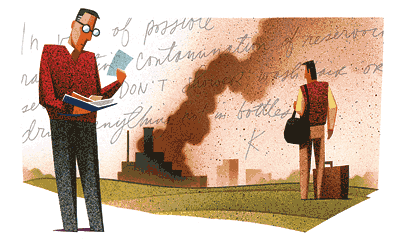Your Page
I was sifting through the pieces of my “Bates College Russian Trip” file recently, digging 20 years into the past, when I came upon a curious item, perhaps the most telling of a remarkable journey — a hand-written note slipped under the door to Room 1202 of the Rus Hotel in Kiev, Ukraine:
“In view of possible radioactive contamination of reservoir, don’t shower, wash hair, or drink anything not in bottles! K.”

Illustration by Marty Braun.
It is but one piece of many from what I think of as my Chernobyl file, a loose pile of papers, photos, ticket stubs, a diary, and newspaper articles from the Short Term trip I took to the USSR my sophomore year. Scheduled for April and May of 1986, “Soviet Culture in the USSR” was canceled after just 17 days because of the steam explosion and subsequent meltdown of Unit 4 reactor at the Chernobyl nuclear power plant.
It is interesting what we find, those pieces we dislodge and the voices we hear again from our past when we dig. I haven’t bothered to lay out the effects of this trip neatly in a photo album as I have other journeys. Perhaps the Chernobyl file, and what it represents, is just too strange for such conventional treatment.
Our group of 16 Bates students was only 50 miles away in Kiev when much of the world began finding out about the unfolding disaster within the closed society of the Soviet Union. On May 4, we flew back to Kennedy Airport, took a bus to LaGuardia, and hopped the shuttle to Logan. At Brigham and Women’s Hospital, we first faced the media, who were packed into the hospital cafeteria, and then underwent tests in the hematology center. We were given the all clear, although my sneakers and someone’s sweater were taken away after they registered traces of radiation.
There are so many piquant memories as I stir through the items in my file — the bright red May Day flags lining the road and the giant metal “Mother Ukraine” statue in the early morning light as we rushed for a flight out of the city; the eerie calmness of Kiev itself going about its normal business during the days we were there; the odd American man toting a Geiger counter who boarded the elevator in the hotel and informed us all of ominous readings; and the Phil Collins song of that year, “Take Me Home,” taking on a weighty symbolism it otherwise would never have.
Assistant Professor of Russian Karen Black, our leader and author of the hand-written note, was pushed far beyond the course outline into the role of ambassador, reporter, and group mother, while, back at home, my parents were among several who were interviewed and put on the evening news. Another person, probably a journalist, posed as my mother and called the U.S. Embassy in Moscow, asking for information about me, which prompted me to send a telegram that arrived at our house two days after I had landed.
Since we were one of the few Western tour groups in the Soviet Union during the meltdown, we became a focal point of a media frenzy. This was, after all, in the waning days of the Cold War, long before the Internet and cell phone cameras. We were in another Bates bubble, and it seems odd now to have been so out of touch. With only tidbits of reliable information, those provided by the kindly Elena, our government-provided Intourist guide, we had to interpret our own understanding of the events, knowing that the truth lay somewhere between the “everything is fine” mantra from the Russian authorities (the Soviet newspapers and TV reported nothing) and the hysterical hypotheses of the Western media.
Twenty years is a long time. Like many of my Bates memories, the Chernobyl trip did impart its sober messages but has also faded a bit with the passage of time and can be counted as an absorbing chapter in the much longer book of my life.
I have traveled far and wide since then. My college Russian skills, sad to say, are all but lost and have, after Peace Corps and six years of living overseas, been replaced by another language, Thai. I have lost touch with every member of the group, and the voice that I now read in my journal is strange to me, an idealistic, academic-sounding kid. As for the Chernobyl file, it seems only right to leave it in its current state — still unorganized and yet accessible — a collage of papers, pictures, and journal entries from that Bates spring of 20 years ago.
Writer Benjamin Malcolm ’88 relocated to the United States from Thailand last year. He and his wife, Supalak, now live and work in Burlington, Vt.